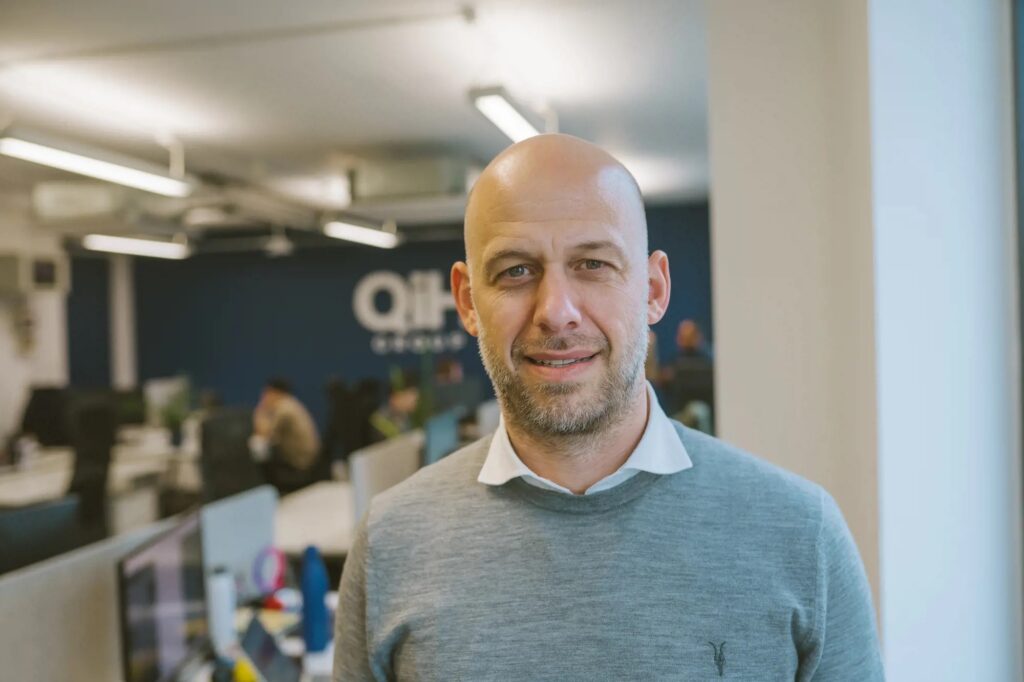Since founding the company with James Newman in 2014, current CEO Jamie Walters has grown QiH into an award-winning business venture at the forefront of the iGaming affiliate industry, writes Lauren Harrison.
Today, QiH operates in regulated markets globally, through Digital Adventures, a suite of iGaming aggregator brands that deliver traffic to the biggest operators in the industry; Wizard Interactive, an affiliate partner for top-tier U.S.-based online casinos looking for high-quality traffic and Tau Marketing Services, three consumer-facing multi-geo casino brands run through the Aspire network.
Meeting at the recent SBC Summit in Lisbon, Jamie spoke with iGamingFuture Head of Content Curtis Roach about the current state and future of affiliate marketing, the impact of AI, the challenges of regulatory constraints and everything in between.
Welcome, Jamie:
How will tightening advertising rules affect affiliates in the iGaming sector? Will operators lean more heavily on affiliate services as restrictions increase?
“When we look at regulation, we view it as both an opportunity and a threat.
“Realistically, if you’re a capable business in this space, you can take advantage of regulatory changes. That said, we’re in the advertising business, and restrictions on advertising are generally unhelpful.
“In some markets, such as Italy, where advertising bans have been implemented, there’s very little space for affiliate marketing. In those environments, the winners tend to be operators with a strong retail presence who can cross-sell customers through an omnichannel approach, also hitting digital audiences.
“At one end of the spectrum–where advertising is entirely prohibited–demand for affiliate traffic is weak. At the other end–where advertising is completely open–operators can reach customers just as effectively themselves.
“The sweet spot for affiliates lies in the middle: Markets where some restrictions create a need for expertise, and affiliates can compete effectively alongside operators in acquiring quality traffic.”
What are your thoughts on the recent AI updates to SEO, and how can affiliates help operators best navigate these changes?
“AI undoubtedly presents a long-term challenge for SEO affiliates, but exactly how that challenge will play out is still evolving. It’s important not to be overconfident with predictions at this stage.
“What we do know is that user behaviour is shifting, and early adopters of AI are showing clear patterns: Complex, long-tail searches, especially those requiring dialogue or follow-up, are moving away from traditional search engines and into AI-powered platforms.
“That doesn’t necessarily spell the end for search as we know it. Transactional searches–when a user knows exactly what they want and is ready to act–continue to perform well on traditional search engines.
“In fact, for gambling audiences, these highly specific transactional queries, such as searches for bonuses, operators, or offers, remain crucial. Traditional search still has a valuable role, especially as platforms like Google integrate AI to create a hybrid model that could deliver the best of both worlds.
“Yes, some types of search will migrate fully to AI, but the kind of queries that drive gambling transactions are likely to endure. For operators, the key will be adapting to this new environment.
“A whole discipline is emerging–known as Generative Engine Optimisation (GEO)–which applies the same principles as SEO but focuses on ensuring content is visible to AI tools.
“Affiliates and operators alike will need to become fluent in this discipline. It’s about learning how to meet the customer where they are, whether that’s on a traditional search engine or inside an AI-driven platform.”
AI is also having a major impact on the way we manage responsible gambling activities online. How can operators best leverage new AI tools to enhance player protection while still maximising the customer experience?
“AI is already transforming responsible gambling (RG) tools and services.
“These systems rely on vast amounts of data to operate effectively, and over time, AI will simply be better than humans at processing that information and executing the necessary tasks.
“Most operators already use machine learning to generate RG flags, but interventions–deciding when and how to act–still tend to be human-led. Looking ahead, AI will likely take on more of those interventions directly.
“The challenge is ensuring that the customer experience remains positive. Anyone who has interacted with a chatbot knows the risk: If it feels like you’re talking to a computer or trapped in a bureaucracy, the process quickly becomes frustrating. The quality of AI-driven interactions will be critical.
“Regulators will also be cautious, and my instinct is they’ll prefer human interventions until AI can clearly demonstrate it reduces gambling harm and improves outcomes.
“As for affiliates, our role in this space is limited but still important. We can help by identifying at-risk customers earlier and, crucially, not marketing to them.
“But that relies on deep partnerships with operators and robust data-sharing agreements. We don’t need personal information, but anonymised data–tied to user IDs–can help us spot patterns across traffic sources. With that, we can flag vulnerable players earlier, keep them from being marketed to, and avoid directing them to operator sites.
“It’s about collaboration. When affiliates and operators work closely together, we can strengthen RG efforts at the source and contribute to a safer ecosystem for everyone.”
You recently hired former LiveScore Media Managing Director James McCarthy as your new Chief Marketing Officer. What does this mean for the future, and how will it help QiH deliver more value to its customers?
“James is a great addition to our team. He’s just completed an 18-month process to build-out our C-suite.
“Alongside James as CMO, we now have Simon Winder as CFO, Sachin Saxena as CTO, and Andrew Lee, who’s been with us since the very beginning in 2013, as COO.
“Together, this group gives us a first-class problem-solving team to tackle the challenges and opportunities ahead.
“James brings both experience and capability. Experience matters because it tells you what works and what doesn’t, but in our industry, we constantly face new problems that require fresh solutions. We needed people who can innovate as well as lead, and James hits that profile perfectly.
“While QiH is already strong in the casino affiliate space–our core market–we see significant opportunities in sports.
“James’s background with sports operators and his work on convergence strategies at LiveScore Bet position him to drive this expansion. His expertise across multiple operators and markets will also support our growth internationally, particularly outside the UK.
“What really sets James apart is his deep understanding of operators. We’ve always seen ourselves as a customer-centric, operator-focused organisation, and that alignment is critical.
“We know the value operators expect from us, how they measure ROI, and what they need to achieve break-even and profitability from the players we deliver.
“James strengthens our ability to meet–and exceed–those expectations. He’s already having a positive impact, and we’re very excited about the role he’ll play in our next stage of growth.”
Editor’s Note:
It appears that for Jamie, no challenge is too big.
His view on regulation is pragmatic. Formed over years of experience, he sees it as both an “opportunity and a threat”, with outcomes ultimately dependent on a business’s capabilities and attitude.
Still, he admits there is a “sweet spot” for affiliates. Markets where advertising is regulated but not prohibited, making expertise essential and meaning affiliates can add real value alongside operator-led activity.
Jamie highlights that as user-behaviour shifts and AI transforms user searches, GEO is emerging as the new lingua franca, and one that he advocates all in the industry must learn to speak.
At the same time, he calls for balance: With AI reshaping multiple disciplines–from marketing to responsible gambling–he argues for AI integration with human-led oversight to continue guaranteeing quality, trust and sustainable growth for both consumers and operators.




